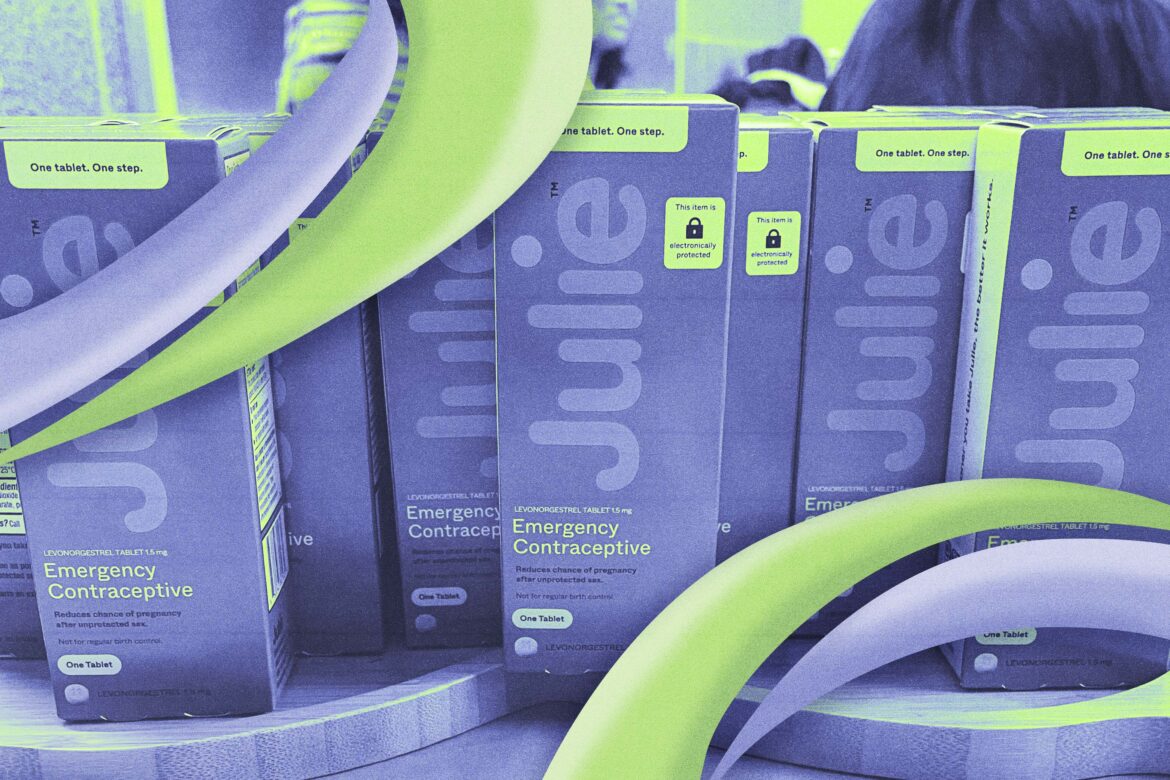Graphic by Jane Montalto
Stony Brook University’s (SBU) chapter of Planned Parenthood Generation Action (PPGA) is working to get Plan B, an emergency contraceptive (EC), into vending machines around campus. They have already made a big first step in their mission to provide access to EC — distributing free packages of it in person at their general body meetings and tabling events.
Cristal Norton, the president of SBU’s chapter of PPGA, along with the rest of the executive board created a petition to garner student interest about placing Plan B in vending machines. They promoted it on social media and across campus. The petition was launched in February of 2023, and they have received over 400 signatures so far. “We’re hoping this shows the university how important it is for students to have access,” Norton said.
This petition outlines the importance of contraceptive options for students, and why distribution through vending machines would be beneficial. It states, “This option will give students the ability to seek out a cheaper and less stigmatizing option for emergency contraception.”
Norton also explained the social barriers to accessing EC. “It’s very frowned upon, it has a lot of stigma behind it,” she said. “That makes it hard for people to just go to the store and grab it.”
The controversy behind EC stems from the wider debate about abortion access, and a misconception of what birth control methods do. According to polls conducted by KFF, as many as 73% of people incorrectly believe that emergency contraceptives can end a pregnancy in its early stages. Since Roe v. Wade was overturned in June 2022, multiple states have — and are continuing to — implement efforts to end abortion access completely. Because of the misconception that EC terminates a pregnancy, it’s often contested by those against abortion.
There are also physical barriers that prevent students from obtaining ECs. “As a student, I’m lucky to have a car, but there are students that don’t,” Norton said. “Student Health Services closes after 4 p.m. and isn’t open on the weekends.”
In order to pilot the initiative, PPGA reached out to Emergency Contraceptives for Every Campus (EC4EC), a program under the parent organization American Society for Emergency Contraception (ASEC). The program works directly with a network of college students on 173 different campuses across 41 states in order to uplift students and break down access barriers.
Nicola Brogan, one of the coordinators for EC4EC, explained why it’s especially important for college students to have access to EC. “The people who are most in need of contraception are young people who are getting their education, where having a child would be a hindrance to the goals that they’ve set,” Brogan said. “On top of that, they’re spending money on their education and typically don’t have an extra $50 to spend on emergency contraception.”
The cost of EC in an on-campus vending machine would be more affordable. An article by the Associated Press details success stories of universities implementing vending machines on their campuses. The University of Washington has a vending machine stocked with Plan B that costs $12.60 — a quarter of what would be sold in-store. At CVS, Plan B costs $49.99. Also according to the article, there are now 39 universities in 17 states with emergency contraceptive vending machines.
In 2017, the University of California at Davis was one of the first to include EC in its “Wellness to GO” vending machines, which are still in operation today. “Vending machines were the first option because they’re an easy way to sell a variety of health products such as condoms, menstrual products and medicines like Tylenol,” Brogan said.
But vending machines are not always feasible or easily accessible. Implementing new vending machines would be costly, and there would be no way to place them in every building around campus. Norton stressed that price is one of the barriers to implementing the vending machines for the SBU chapter. “We’re hoping to utilize the machines that are already in major parts of campus so that we don’t have to fundraise for brand-new equipment that would cost thousands of dollars,” she said.
Several of the vending machines on campus already offer healthcare items, including condoms. Adding Plan B to them would be the next step for SBU to widen the availability and variety of contraceptive methods.
For universities where vending machines aren’t financially or logistically feasible, EC4EC added a second component of this initiative: peer-to-peer distribution. “We provide students with support for this type of distribution because it’s a free outlet that can reach a much wider audience,” Brogan said.
Norton and the rest of PPGA piloted the peer-to-peer distribution at Stony Brook. They initially received 64 packages of Plan B from EC4EC and sent out a form for students to fill out if they needed the resource. With over 80 initial responses to the form, the organization quickly distributed the packages they had. “I dropped a package off to someone at 10:30 at night,” Norton said. “We were joking around saying it’s like DoorDash for Plan B.”
PPGA has since applied for more, and they reopened the form to give more students access. The form allows students to pick exactly what resources they need along with Plan B — such as condoms, pregnancy tests or other sexual health items. Once students fill out the form, members of the PPGA executive board distribute the packages at their general body meetings or at tabling events.
At their meetings, PPGA has a table full of free resources for students to take. Along with EC, they also provide pamphlets and fliers for how to access PEP and PrEP, which are medications to prevent HIV.
Plan B is used most often as the colloquial term for all EC. The EC that the club currently provides is the brand Julie, which functions as the same morning-after pill like the generic Plan B brand.
Kloey Kun, a sophomore, used the form to pick up a package of Plan B while PPGA was at a club involvement fair last semester. “All I had to do was grab a paper bag, and they had other safe sex goodies that were free to take in case I needed them,” Kun said.
Kun was excited to see that PPGA started this initiative. “It’s super important for students to have control of their reproductive health,” they said. “And this is free, comfortable and takes the stress off of students’ shoulders who already deal with enough.”
While this program has already reached a large audience, Norton hopes to implement the EC program in vending machines before she graduates. She has been a part of PPGA for all four years of college, serving as president for three years. “I want to see this done before I leave.”
This initiative has the support of Stony Brook Undergraduate Student Government (USG) President Devin Lobosco, as well as Samantha Warren, health promotion specialist at Stony Brook’s Center for Prevention and Outreach. They are currently in the process of working out the logistics of the vending machines, and there have been several meetings between PPGA, USG and Student Health Services.
Brogan wants students across the nation to not give up on their mission to expand contraceptive access. “It takes one person to make a difference,” she said. “It doesn’t matter how big your school is if this is something you’re passionate about. Whether it’s doing peer-to-peer distribution or implementing a vending machine, this has lifelong implications where you can change what the next generation’s access is like.”




Comments are closed.